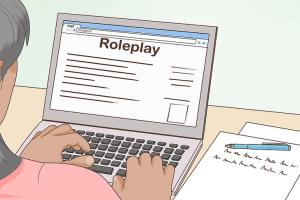Mastering Online Roleplay: A Comprehensive Guide for Enthusiasts

-
Quick Links:
- Introduction to Online Roleplay
- Understanding Roleplay
- Choosing the Right Platform
- Creating Your Character
- Developing a Storyline
- Interacting with Other Players
- Roleplay Ethics and Guidelines
- Case Studies and Examples
- Common Mistakes to Avoid
- FAQs
Introduction to Online Roleplay
Online roleplay has evolved significantly, providing a rich landscape for creativity, storytelling, and social interaction. Whether you are a seasoned veteran or just starting, this comprehensive guide will help you navigate the intricacies of online roleplaying.
Understanding Roleplay
Roleplaying (RP) is an act of assuming the identity of a character and immersing oneself in a fictional world. There are several types of roleplay, including:
- Text-Based Roleplay: Often occurs in forums or chat rooms where players write out their actions and dialogue.
- Voice Roleplay: Involves using voice chat platforms to interact in character.
- Live Action Roleplay (LARP): In-person events where players physically act out their characters.
The beauty of online roleplay is its accessibility; players from around the world can join and create diverse narratives.
Choosing the Right Platform
When starting your online roleplaying journey, selecting the right platform is crucial. Here are some popular options:
- Discord: Great for voice and text roleplay with community features.
- Roll20: Perfect for tabletop RPGs, offering virtual dice and character sheets.
- Forums: Ideal for text-based roleplay with structured threads.
- Social Media Groups: Facebook or Reddit groups often host roleplay communities.
Factors to Consider When Choosing a Platform
- Type of roleplay you are interested in (text, voice, or LARP).
- Your preferred genre (fantasy, sci-fi, modern, etc.).
- Community size and activity level.
- User interface and ease of use.
Creating Your Character
Your character is the heart of your roleplay experience. Here’s a step-by-step guide to creating a compelling character:
Step 1: Choose a Name
Your character’s name should reflect their background and personality. Consider their origin, culture, and the world they inhabit.
Step 2: Define Background and Personality
Develop your character's history, motivations, and traits. Ask yourself questions like:
- What is their backstory?
- What are their goals and fears?
- How do they interact with others?
Step 3: Choose Skills and Abilities
Depending on the roleplay setting, define your character’s skills. This could range from magic abilities to combat skills or social influence.
Step 4: Visual Representation
Having a visual representation can enhance your roleplay experience. Use character creation tools or art to depict your character’s appearance.
Developing a Storyline
A strong storyline enriches the roleplay experience. Here are some tips for developing engaging narratives:
Collaborate with Other Players
Involve fellow players in creating the storyline. Discuss potential plots and arcs that can include multiple characters.
Set Goals and Conflicts
Establish clear goals for characters and introduce conflicts that drive the narrative forward. This could involve quests, personal challenges, or group dynamics.
Maintain Flexibility
While having a storyline is important, be open to changes. Roleplay is dynamic, and unexpected twists can lead to exciting developments.
Interacting with Other Players
Effective communication is key to successful roleplay. Here are some interaction tips:
- Stay in Character: Immerse yourself in your character’s persona during interactions.
- Respect Boundaries: Always check for consent, especially with sensitive topics.
- Be Responsive: Engage with others’ actions and dialogue to create a collaborative narrative.
Roleplay Ethics and Guidelines
Ensuring a positive environment is vital for enjoyable roleplay. Adhere to these ethical guidelines:
- Respect others' boundaries and comfort levels.
- Avoid god-modding (controlling others' characters).
- Communicate openly about plot directions and character arcs.
Case Studies and Examples
To illustrate successful online roleplay, let’s explore a few case studies:
Case Study 1: The Fantasy Realm
A Discord server dedicated to high fantasy roleplay saw tremendous engagement by establishing structured character creation guidelines and a collaborative world-building process.
Case Study 2: Modern Urban Roleplay
A Reddit community focused on urban life roleplay fostered creativity by allowing players to submit their story arcs, which encouraged participation and creativity.
Common Mistakes to Avoid
Even experienced roleplayers can make mistakes. Here are some pitfalls to avoid:
- Neglecting character development.
- Ignoring other players’ contributions.
- Becoming overly attached to your character’s success.
FAQs
1. What is online roleplaying?
Online roleplaying involves creating and acting out characters in a fictional setting, often through text or voice communication.
2. Do I need prior experience to start roleplaying online?
No prior experience is necessary; anyone can start roleplaying with a willingness to engage and learn.
3. What platforms are best for beginners?
Discord and text-based forums are great starting points due to their user-friendly interfaces and active communities.
4. How can I improve my roleplaying skills?
Practice regularly, engage with other players, and pay attention to storytelling techniques.
5. Is there a specific format for roleplaying?
Formats vary; however, most roleplays follow a structure of narrative writing, character dialogue, and action descriptions.
6. Can I create multiple characters?
Yes! Many roleplayers create multiple characters to explore different narratives and dynamics.
7. How do I handle conflicts with other players?
Address conflicts directly and respectfully, and if necessary, involve a mediator or moderator.
8. What are the best genres for online roleplay?
Popular genres include fantasy, sci-fi, horror, and modern drama, but the best genre is one that interests you and your group.
9. How can I create a compelling backstory?
Focus on your character's motivations, relationships, and significant life events that shape their personality.
10. What should I do if I feel overwhelmed?
If you feel overwhelmed, take a break, connect with supportive players, and remember that roleplay is meant to be fun!